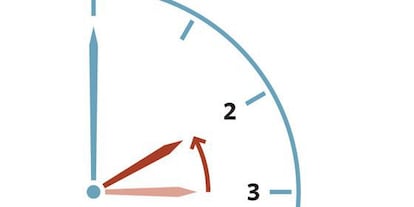Clocks to go back one hour on Sunday
Fall change brings up issue of Spain's odd adherence to Central European Time

Clocks in Spain will go back one hour this Sunday October 25, marking the end of daylight saving time.
At 3am, the time will jump back to 2am, in line with the European Union directive that ensures that all 28 member states change their clocks simultaneously.
According to estimates by the Institute for Energy Diversification and Saving (IDAE), the time change could potentially save Spain five percent on its electric lighting bills – around €300 million.
Around 70 other countries adjust their clocks. Japan is the only developed nation not to do so
The fact that Spain has two time zones – one for the peninsula and Balearic Islands, and another for the Canaries – needs to be taken into account in determining the moment when the hour change takes place. A 2002 royal decree recognizes this fact in order to guarantee that the clocks go back at the same instant across all national territory.
Along with Spain, around 70 other countries adjust their clocks across the world. Japan is the only developed nation not to do so.
The time change brings up another related issue that has been the subject of much debate in Spain: whether the country should remain on Central European Time (CET) or go back to Coordinated Universal Time – the successor to Greenwich Mean Time or GMT, the time zone in which it naturally falls.
Spain is in western Europe, the same as Portugal, the United Kingdom and France – that is to say, one hour behind central Europe. But in 1942, at the height of World War II, Germany changed occupied France's clocks to match Berlin time, while Britain, Portugal and Spain followed suit, albeit for different reasons.
The former meant to take advantage of the long summer evenings to increase productivity, particularly on farms, as well as to avoid confusion with its allies in Europe; Spain’s decision was seemingly a show of loyalty to Hitler and recognition that Germany was now the new master of the continent.
At the end of the war, in 1945, Britain and Portugal returned to GMT, while France and Spain remained an hour ahead. France’s decision made sense on the basis that most of its land mass falls within CET anyway, but that is not the case with Spain.
English version by Susana Urra.
Tu suscripción se está usando en otro dispositivo
¿Quieres añadir otro usuario a tu suscripción?
Si continúas leyendo en este dispositivo, no se podrá leer en el otro.
FlechaTu suscripción se está usando en otro dispositivo y solo puedes acceder a EL PAÍS desde un dispositivo a la vez.
Si quieres compartir tu cuenta, cambia tu suscripción a la modalidad Premium, así podrás añadir otro usuario. Cada uno accederá con su propia cuenta de email, lo que os permitirá personalizar vuestra experiencia en EL PAÍS.
¿Tienes una suscripción de empresa? Accede aquí para contratar más cuentas.
En el caso de no saber quién está usando tu cuenta, te recomendamos cambiar tu contraseña aquí.
Si decides continuar compartiendo tu cuenta, este mensaje se mostrará en tu dispositivo y en el de la otra persona que está usando tu cuenta de forma indefinida, afectando a tu experiencia de lectura. Puedes consultar aquí los términos y condiciones de la suscripción digital.








































